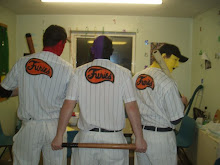I just thought. One of the reasons i started writing this blog (apart from trying to motivate my lazy ass into doing some work, and maybe having a written account of my progress for my uni tutors) was that i've found it so hard to find anything about the writing process on the internet anywhere. So, maybe if i cover a little bit about how i've got to where i've got (which, as you'll discover, isn't very fucking far) it might actually help someone....if anyone actually reads this thing. Which i doubt very much. Anyhow.....
Yeah, like anything else i do, before i get to the meat, i procrastinate. In cases such as this, my procrastination might actually be fairly helpful, because i went out and bought just about every book on screenwriting i could find. It's funny, my girlfriend always takes the piss out of me for reading around subjects, because i think she's come to realise that i sometimes do more 'reading' than 'doing'....which might be true.
The books i've found the most useful have been
Screenplay by Syd Field
The Screenwriter's Workbook, again by Syd Field
Making a Good Script Great by Linda Seger
Now, i've read other books on screenwriting, and although some have had useful tips in them, i feel that generally, they've not been worth the money.
Also, i read Story, by Robert McKee, and found it utterly pretentious. Now i know, it's meant to be pretty much close to The Bible for screenwriters, but i just couldn't read the fucking thing. He really goes on about 'story' in the most abstract sense (and having a degree in philosophy, i'm farily used to the abstract), which i didn't find useful to me in any practical sense whatsoever. But then again, he's a guru, and i've written fuck all, so what do you know!
As well, i just want to give a mention to How Not To Write a Screenplay by Denny Martin Flinn, which having read it, is going to be worth its weight in gold when i come to polish up the damn thing...
So, ok. I pretty much followed Syd Field's three act structure, which breaks down something like this
ACT 1- SET UP (PAGES 1-30. PLOT POINT 1 AT PAGE 20)
ACT 2- CONFRONTATION (PAGES 31-90. MID POINT AT PAGE 60, PLOT POINT 2 AT PAGE 80)
ACT 3- RESOLUTION (PAGES 91-120. LAST MAJOR PLOT POINT AT PAGE 110)
All the acts also have specific things which should happen in them, for example in ACT 1 the first 10 pages should set up all the main characters, and the dramatic drive of the script, then about 20-25 pages in should be the first plot point, which spins the story around into the second act.
I won't go into it in major detail, as Syd does a far better job than me in his books.
Once i knew pretty much what would happen in my story in terms of beginning, middle and end, i tried to make it fit into his paradigm- making sure all the plot points happen roughly where he suggests, etc. Don't get me wrong, this took quite a lot of fiddling about. At times it felt like a kid trying to hammer a square peg into a round hole. You'd be suprised what a difference it makes if you make a certain plot point the main turning point of an act, rather than another plot point.
I know there's a certain amount of arguments about imposing such a rigid structure on a screenplay, and you can argue that many of your favourite films don't fit into it, but i felt like it offered me a certain amount of help, this being my first feature-length script. I guess it's the old cliche of 'you have to learn the rules before you can break the rules'...
Tuesday, 29 January 2008
You have to know the rules, before you can break the rules...
Labels:
Denny Martin Flinn,
lampeter,
Linda Seger,
Philosophy,
plot,
Robert McKee,
screenwriting,
Syd Field,
university,
wales,
writing
Subscribe to:
Post Comments (Atom)




2 comments:
Hey up Mr. P. Glad I found your blog. It's nice and/or demoralising to see that even people studying screenwriting are having a hard a time as me at sitting down and getting on with things.
I have the same problem as you, I read around subjects but never put any of my freshly gleaned knowledge to any use. I have all of Syd Fields books and found them invaluable, however, despite knowing what should and shouldn't work, I still find it impossible to morph my ideas into words on a page.
I highly reccomend getting a copy of "The Writers Journey: Mythic Structure for Wrires" by Christopher Vogler. It is genuinely fascinating.
I have also started a blog recently in order to get myself writing again. so far, so apathetic. Feel free to check it out at fan-dan-go.blogspot.com
Catch thee later.
Dan
I didnt realise I was so famous,there is a reference to me in so many enteries. Keep plugging away and theres nowt wrong with reading around a subject! Lisa x
Post a Comment